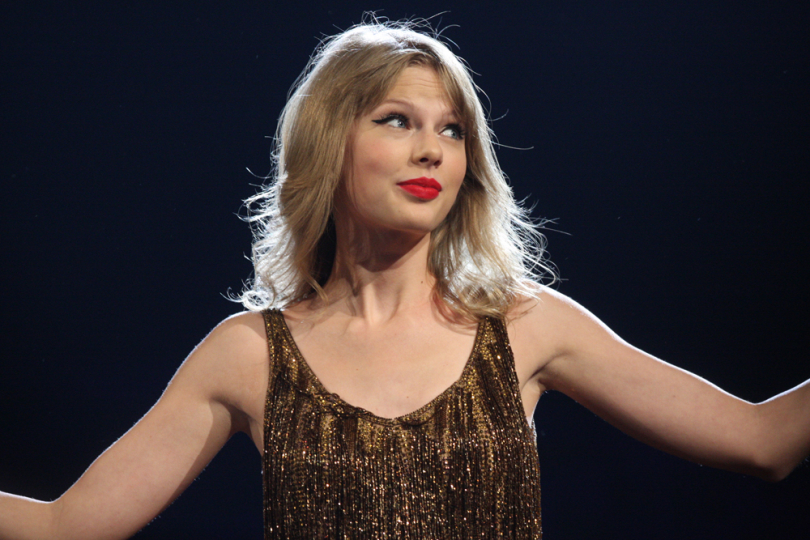
TOP 5 Reasons Why We Need to Talk About Taylor Swift
Her name is on everyone's lips today and we can say that 2023 belongs to Taylor Swift, who currently holds the top position in the music industry. In a digital age that has shredded our attention into a million pieces, democratized music production and distribution, and most importantly created a constantly bubbling and erratic scene of instant modern-day celebrities, Taylor Swift is a phenomenon in her own universe, where she rules an utterly devoted army of dedicated fans as their goddess. Let's take a look at the TOP 5 reasons why we just have to talk about Taylor Swift – even if she might not be your cup of tea.
1. A girl from a good family
Taylor Alison Swift was born on 13th December 1989 in West Reading, Pennsylvania. She was named after singer and composer James Taylor who has been one of America's most successful folk pop rock singer-songwriters since the 1970s, with over 100 million records sold. From the very beginning, her parents have provided her not only financial (her father being an investment broker) but especially moral support. Marjorie Finlay, her maternal grandmother, was an opera singer whom little Swift used to hear singing in church. Otherwise, she was shaped by Montessori preschool, the Berks Youth Theatre Academy from the age of nine, and a trip to the country music home of Nashville, Tennessee, with her first demos in hand at the age of eleven.
When Swift was about twelve, computer repairman and local Nashville musician Ronnie Cremer taught her to play guitar. He also helped her with her first songwriting attempts, which led to the writing of "Lucky You". In 2003, Swift and her parents began working with New York-based talent manager Dan Dymtrow. With his help, she became a model for Abercrombie & Fitch as part of their Rising Stars campaign and one of her songs was even included on a Maybelline compilation CD.
After a showcase at RCA Records, the then 13-year-old Swift signed an emerging artist contract and began making frequent trips to Nashville with her mother. The entire Switft family then moved to Hendersonville, Tennessee, to fully support her budding career. Taylor graduated from high school a year earlier than the others and was homeschooled due to her frequent gigging. Well, could there be a more ideal environment to support the development of a singing star's career?
2. She knows what she wants
Swift hasn't just been a cute – “sic” ambitious – blonde since she was a little girl. This is evidenced by her incredible self-confidence at the very beginning when she was just a teenager. In fact, in Nashville, Swift collaborated with some of Music Row's most experienced songwriters (you may not know names like Troy Verges, Brett Beavers, Brett James, Mac McAnally or the Warren Brothers but these are the top hitmakers and producers of the American country music scene). She also began meeting a professional songwriter Liz Rose every Tuesday afternoon after school for two-hour sessions, who describes their collaboration as one of the easiest she's ever done: "Basically, I was just her editor. She’d write about what happened in school that day. She had such a clear vision of what she was trying to say. And she’d come in with the most incredible hooks."
Swift soon became the youngest artist under the Sony/ATV Tree label, however, at the age of fourteen she left RCA Records (later owned by Sony Music) due to the label's lack of care for its artists. She was also concerned that the contracts that young, emerging artists were signing with the label were ultimately actually hindering and limiting their careers. In an interview with The Daily Telegraph, she said of this period, "I genuinely felt that I was running out of time. I wanted to capture these years of my life on an album while they still represented what I was going through."
She continued on her uncompromising path to independence and wasn't afraid to tackle giants like Apple Music and Spotify. In 2014, she pulled her entire catalogue from Spotify because she didn't agree to lower royalties for artists on the ad-free version. In 2015, Swift criticized Apple Music for not offering royalties to artists during the free streaming service's three-month trial period and said she would pull her entire 1989 album from there. She asserted hers, and as of 2017, she is back on all streaming platforms.
Most recently, she again negotiated great terms for the distribution of her concert documentary for the Eras Tour, bypassing the movie studios and going directly to the distributor, AMC Entertainment. The effort paid off, and it also helped her not only break the record for ticket sales in cinemas in a single day, but more importantly, it broke records in her revenue. In fact, under the deal, she received 57% of the ticket sales, while cinemas retained 43% of the revenue. She commented to Time magazine, "We met with all the studios and we met with all the streamers, and we sized up how it was perceived and valued, and if they had high hopes and dreams for it. Ultimately I did what I tend to do more and more often these days, which is to bet on myself." And again, family helped, with her father having the idea to reach out to people at the source: "He just said, why does there have to be a – for lack of a better word – middleman." Swift knows what she wants, and she's certainly not afraid to push her vision – and in this case, a very lucrative business that's bringing her fabulous profits.
3. Songs as a diary
Swift identifies herself first and foremost as a songwriter who uses her voice not as an instrument, but as an emotional vehicle to convey her lyrics. Indeed, her mezzo-soprano vocal range was criticized by some publicists during her country period as weak and strained compared to others in the business. Swift herself has admitted that her vocal abilities often troubled her early in her career and she had to work hard to improve them.
Taylor Swift's lyrics are full of personal experiences and feelings. In particular, the songs from her early period actually helped her navigate through life. She developed a unique "journaling" technique that begins with identifying an emotion followed by a corresponding melody. On her first three studio albums, the dominant themes were love, heartbreak and all manner of insecurities and fears of growing up. The album Red became famous for its description of tumultuous (mostly toxic) relationships, and in the 1989 album Swift came up with nostalgia and post-romantic positivity. Reputation was inspired by the darker sides of fame, and Lover is a more mature interpretation of relationships, with Taylor acknowledging "a full spectrum of emotions".
On her 2020 album Folklore and Evermore, Swift took a moment to break away from her persona and come up with fictional stories and characters. One reason for this may have been a desire for more privacy and to expand her artistic possibilities. After all, even if you love and honour yourself, it's pretty limiting to write only about yourself and your authentic experiences. However, on Midnights, her tenth studio album, released in 2022, we do get the concept of a sleepless night-inspired meditation, but Swift is back to autobiographical lyrics exploring her own emotions. The songs also harbour cryptic, personal life-referencing messages for Swifties, her loyal legion of fans who love uncovering the secret codes hidden in the "Swift universe".
4. Swifties
This term refers to Taylor Swift's devoted (some might even say fanatical) fans and enthusiastic admirers. The artist even had the term registered with the U.S. Trademark Office in 2017. Swifties are a subculture, a sociocultural phenomenon that scholars study in their research. Swift maintains constant and active close relationships with her Swifties. They are, in fact, a large group of friends who live and grow on the music and personality of Taylor Swift. The intimate level of connection with fans is considered to be quite unique in artists of her calibre. She communicates with them directly on social media, sends them gifts, chooses them herself to attend private concerts or meet-and-greets, sets up unexpected visits, attends some of their events (like weddings) and gives away free tickets to underprivileged or disabled fans.
The hints in the lyrics or in the way she dresses produce a kind of constant hunt for hidden "treasures", where fans eagerly watch and analyse every public act of their idol. In return, Swift not only repays them with attention (in 2010, she spent thirteen hours with her fans at a meet & greet at the CMA Festival in Nashville!) but also sometimes contributes financially to their student loans, medical bills, rent or other expenses. In 2018, she even bought a house for a pregnant fan who was living on the street.
Swift also plays around with promotional concepts for her albums, often referred to as "eras". Each era features an aesthetic, colour palette, mood and fashion style that Swifties adore, vehemently emulate, and, of course, promote on all social media channels. As for the population makeup of Swifties, according to recent research from Morning Consult, in the U.S., 45% are millennials, 23% are baby boomers, 21% are Gen X and 11% are Gen Z. 53% of adults said they were Swift fans, 52% of whom were women and 48% men. So quite a diverse generational range, isn't it? Incidentally, I was inspired to write this article by a friend of mine who is a huge Swift fan (I probably wouldn't say he reaches the quality of senior Swifties but he definitely listens to her every new album with interest).
5. The first billion
You can say what you want about Taylor Swift but one thing is for sure: her success in the music industry is phenomenal on all fronts, and this is at a time when streaming platforms and the digital revolution have swept away traditional distribution models or marketing – a time when global popstars and big bands are disappearing, a time when anyone can produce and distribute music from their bedroom. Taylor Swift's net worth is estimated by Forbes and Bloomberg News to be around $1.1 billion, making her the first artist to achieve billionaire status solely from music royalties, touring and her impressive catalogue.
Rihanna, Jay-Z or other successful musicians have to make do with lucrative "side hustles" such as income from cosmetics and fashion brands, investments in funds or their alcohol brands, etc. The year 2023 belonged to Swift in every way. Her Eras Tour broke attendance records, she was named Time magazine's Person of the Year, the Eras Tour documentary surpassed Justin Bieber's most successful music film to date, Never Say Never, and her single "Cruel Summer" dominated the charts and streaming platforms. Indeed, what Swift touched last year turned not into gold, but straight into gems.
Taylor Swift is only thirty-four years old, and although she jokingly refers to herself as a geriatric pop star, she doesn't seem to be worried about ageing and the future. I'm curious to see where her next steps will lead, how she will evolve as an artist approaching middle age, and how her legacy will fare in the context of popular music. Will we remember the Swifties with the same nostalgia as we do Beatlemania? Thirty years from now, will we be dancing in our living rooms to "Shake it Off"? Or hold back tears at the memory of the Eras Tour?
Zdroje: Time, Forbes, Wikipedia, YouTube
If you have found an error or typo in the article, please let us know by e-mail info@insounder.org.





